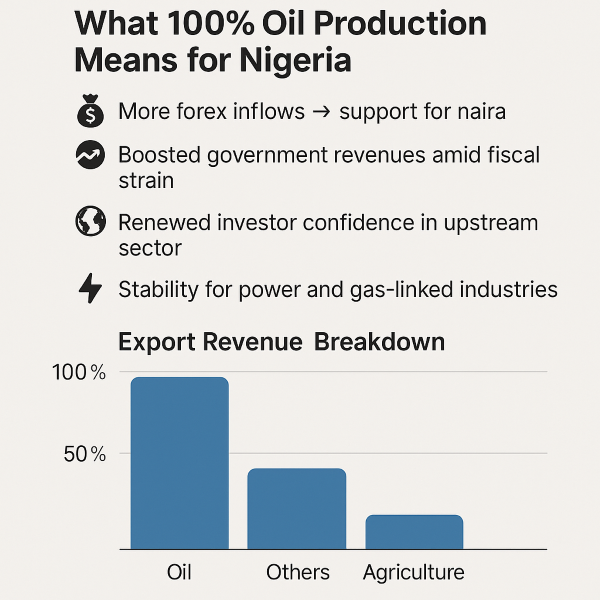Nigeria Nears Full Oil Production as Security Gains Stabilise Niger Delta – NNPCL

Nigeria is inching closer to achieving 100% crude oil production capacity, following a dramatic turnaround driven by strengthened collaboration between the oil and gas industry, the armed forces, and intelligence agencies.
Group Chief Executive Officer of the Nigerian National Petroleum Company Limited (NNPC Ltd.), Bayo Ojulari, disclosed this at the maiden African Chiefs of Defence Staff Summit in Abuja, stressing that the recovery reflects the dividends of deliberate and sustained security partnerships.
From Crisis to Recovery
Only a few years ago, Nigeria’s oil production was in free fall. Pipeline vandalism, crude theft, and illegal refineries in the Niger Delta cut receipts to as low as 20–30% capacity, threatening government revenues and Nigeria’s position within OPEC.
“Today, I can proudly report that our production and receipts are now attaining close to 100%. This turnaround is thanks to the professionalism, discipline and collaborative spirit of our security and intelligence agencies,” Ojulari said.
According to him, joint patrols, intelligence-driven interventions, and targeted military operations have played a decisive role in securing oil infrastructure and restoring investor confidence.
Why It Matters
Oil remains Nigeria’s single largest foreign exchange earner, accounting for more than 80% of export revenues and about 50% of government income. The near-restoration of production to optimal levels provides:
- Fiscal Relief: Boosted government revenues amid mounting debt and subsidy reform pressures.
- Investor Confidence: Clearer operating environment for IOCs and independents.
- Macroeconomic Stability: Improved forex inflows to support the naira.
- Sectoral Rebound: Renewed optimism in upstream investments, particularly in marginal fields.
Yet, industry experts caution that sustaining this recovery requires institutionalising the current gains.
Oil Theft: A Local Problem with Global Syndicates
Ojulari warned that threats to Nigeria’s oil infrastructure are not limited to local saboteurs. International crime syndicates are increasingly exploiting gaps in Nigeria’s security architecture and regional coordination to traffic stolen crude.
This underscores the need for regional and continental cooperation, he argued:
“Energy security must be treated as a shared strategic priority across Africa. Together we can safeguard our resources, reinforce peace, and create prosperity for our people.”
Regional Implications: Security as Energy Policy
The NNPC boss’s remarks at the summit highlight the blurring of lines between energy policy and security strategy. Africa’s oil and gas resources remain a critical driver of development, but they are also magnets for transnational crime, piracy, and sabotage.
By situating Nigeria’s production recovery within the broader African defence dialogue, Ojulari made the case that protecting oil infrastructure is no longer a national issue alone, but a continental imperative.
The Bigger Picture: Sustaining the Gains
Nigeria’s near-100% recovery in crude production is a milestone, but it also raises important structural questions:
- Can security wins be institutionalised? Reliance on military interventions must be complemented by reforms in surveillance technology, host community engagement, and stronger governance.
- Will revenues be reinvested wisely? With oil receipts improving, Nigeria faces renewed pressure to channel funds into diversification and infrastructure rather than recurrent expenditure.
- How will global energy shifts affect Nigeria? As the world accelerates its energy transition, Nigeria must balance maximising crude output with scaling up gas and renewables.
BRANDECONOMY Takeaway
Nigeria’s oil production revival is a rare piece of good news in a sector often dogged by theft, sabotage, and underperformance. Achieving near-100% capacity underscores the power of security–industry collaboration and offers a fiscal lifeline at a time of severe economic strain.
But sustaining this momentum will require more than military patrols. It demands institutional resilience, transparency, and forward-looking policies that balance immediate oil gains with long-term energy transition goals.
For Africa’s largest oil producer, the message is clear: Nigeria is back in the game—but must play smarter to stay there.












